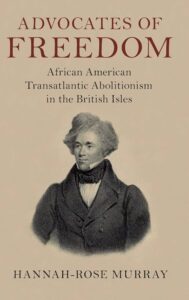University of Edinburgh Press | Published 2020 | 371 pages | ISBN 9781108487511
 From the publisher: “During the nineteenth century, scores of formerly enslaved individuals like Frederick Douglass traveled to England, Ireland, Scotland and even parts of rural Wales to educate the British public on slavery. By sharing their oratorical, visual and literary testimony to transatlantic audiences, African American women and men were soldiers in the fight for liberty, and as a result their journeys were inevitably and inescapably radical. Their politicized messages and appeals for freedom had severe consequences for former slaveholders, pro-slavery defenders, white racists and ignorant publics: the act of traversing the Atlantic itself highlighted not only their death-defying escapes from bondage but also their desire to speak out against slavery and white supremacy on foreign soil. They traveled thousands of miles, wrote hundreds of letters or narratives and lectured to millions of people, for hours on end. In doing so, they often pushed their bodies (and voices) to breaking point. In this book, I theorize that throughout their journeys to Britain, African Americans engaged in a uniquely British strategy I have termed adaptive resistance, which attempts to measure their success on the Victorian stage by examining their exploitation or relationship with abolitionist networks, print culture and performance.”
From the publisher: “During the nineteenth century, scores of formerly enslaved individuals like Frederick Douglass traveled to England, Ireland, Scotland and even parts of rural Wales to educate the British public on slavery. By sharing their oratorical, visual and literary testimony to transatlantic audiences, African American women and men were soldiers in the fight for liberty, and as a result their journeys were inevitably and inescapably radical. Their politicized messages and appeals for freedom had severe consequences for former slaveholders, pro-slavery defenders, white racists and ignorant publics: the act of traversing the Atlantic itself highlighted not only their death-defying escapes from bondage but also their desire to speak out against slavery and white supremacy on foreign soil. They traveled thousands of miles, wrote hundreds of letters or narratives and lectured to millions of people, for hours on end. In doing so, they often pushed their bodies (and voices) to breaking point. In this book, I theorize that throughout their journeys to Britain, African Americans engaged in a uniquely British strategy I have termed adaptive resistance, which attempts to measure their success on the Victorian stage by examining their exploitation or relationship with abolitionist networks, print culture and performance.”